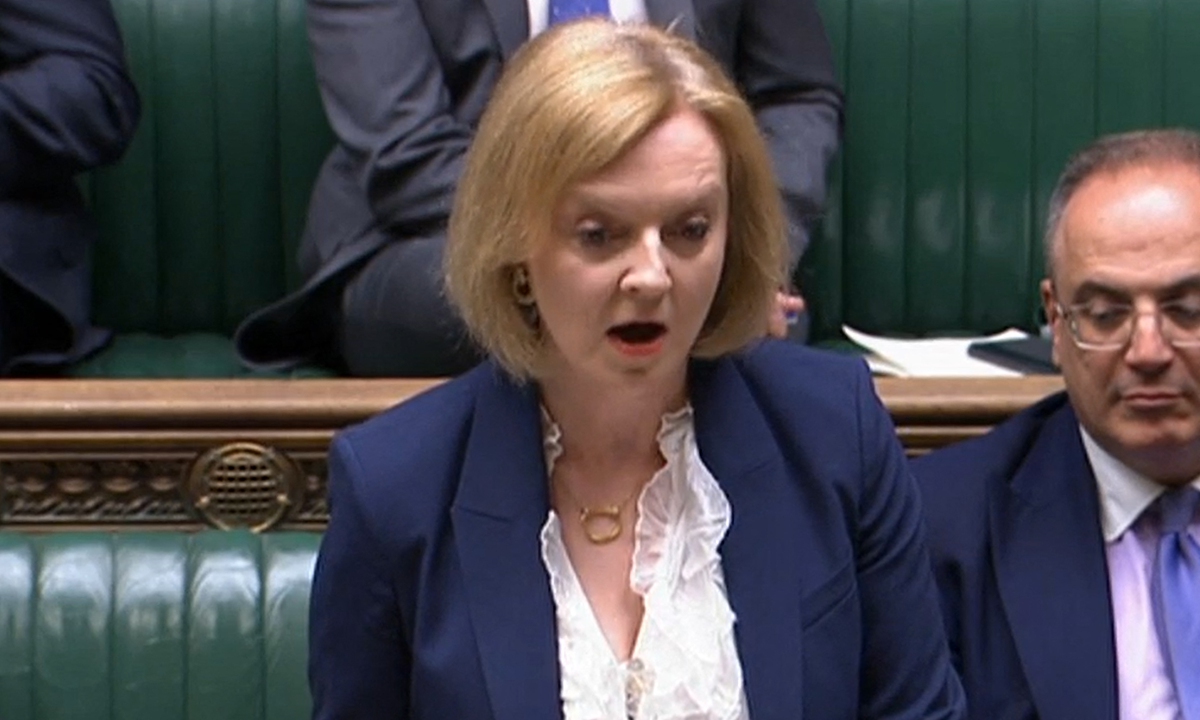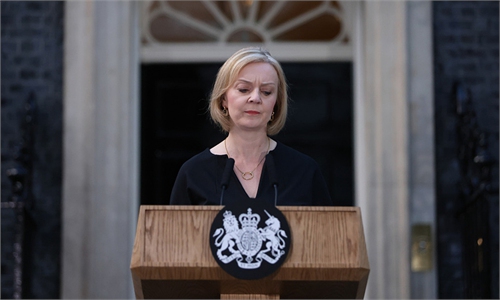
Liz Truss Photo: AFP
Former UK Prime Minister Liz Truss will visit Taiwan next week. In addition to meeting with senior officials of the Taiwan authorities on the island, she will also give a speech. This "keynote speech" could earn her tens of thousands of pounds, according to The Mirror.Taking a tough stance against China has been Truss's political stance, even when she was the UK prime minister and foreign secretary. She made provocative remarks about China in order to win more votes when she was campaigning to become the prime minister. After leaving office, she continued to spread her hard-line views on China on various occasions.
Zhao Lijian, former spokesperson of China's Ministry of Foreign Affairs, once said "I want to make it clear to certain British politicians that are making irresponsible remarks about China, including hyping up so-called 'China threat,' cannot solve one's own problems." However, figures like Truss continue to wave the anti-China banner after leaving office, seeking support from the conservative forces and trying to gain political capital.
Currently, the British government seems to have a contradictory approach: Foreign Secretary James Cleverly called for "robust and constructive" relations with China, but also criticizes China's domestic policies; there are signs the current government is trying to ease its relationship with China, but the former prime minister is planning to visit Taiwan.
Wang Shuo, a professor at the School of International Relations of Beijing Foreign Studies University, told the Global Times that the attitude toward China in the UK, both within the Conservative Party and throughout the political sphere, is divisive. On the one hand, this shows the UK itself cannot find its position in the world. On the other hand, it is related to the unclear positioning of how the UK should play a role in the world and how to deal with China.
"Truss's visit to Taiwan is a direct manifestation of this internal division. Truss is well aware that she cannot represent the official stance, and her actions will not have an impact on the Taiwan Straits situation. But she still chooses to do so, in order to appeal to two groups of people: the hardliners within her party, and the pro-American faction in the UK as well as the US," Wang said.
For Truss, being anti-China is nothing but a means to boost her image among the hardliners in the UK. This is her base, and she needs to get their support to continue to thrive in politics in the future.
During her campaign, she intentionally imitated Margaret Thatcher in many ways. However, it turned out that Truss had the political ambition but not political ability of Thatcher. She eventually left office in a mess, as the shortest-serving prime minister in UK history. However, Truss did not stop after leaving office, but instead attempts to make waves by the planned Taiwan visit. If she stays in Taiwan for a while, it might be longer than her tenure as prime minister.
Now, she is mostly putting on a show, and her ultimate goal is to become a representative of the hardliners. But Truss needs to understand that Taiwan is not an "internet celebrity check-in spot" where politicians can visit at will to gain political capital, nor is it a tool that anyone can use to "contain China."
Truss's tough and radical style is in contrast to the relatively moderate Rishi Sunak. When the Sunak administration is trying to ease relations with China, Truss is planning the Taiwan visit. Such political divisions can have a significant impact on the rationality, stability and sustainability of UK's internal and external policies. The Guardian also expressed concern that Truss's move will potentially upset the UK government's careful approach to China relations.
During Brexit, the UK emphasized the particularity of the UK, which led to the emergence of a trend of nationalism.?These sentiments forced UK politicians to view China as a rival or even an enemy, and hijacked the UK government's viewpoint, leading to the tough attitude toward China, noted Li Guanjie, a research fellow from the Shanghai Academy of Global Governance and Area Studies, under the Shanghai International Studies University.
Li said that however, as figures such as Boris Johnson and Truss, who emphasized UK nationalism, have slowly faded out of the UK political scene, this sentiment is gradually decreasing. Now, Truss can only represent her personal views and not those of the UK government. The relationship between China and the UK is slowly turning around. It's suggested washed-up political figures had better not make anti-China remarks or actions to hinder the development of bilateral relations.

